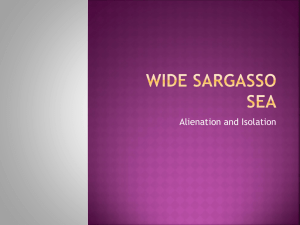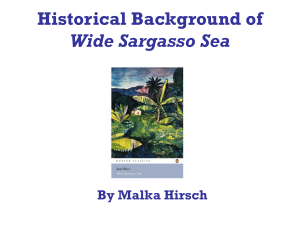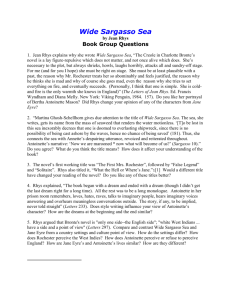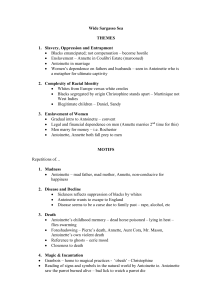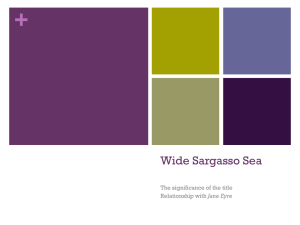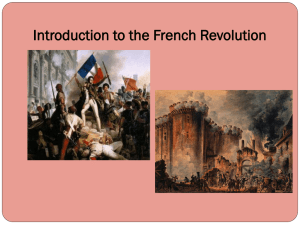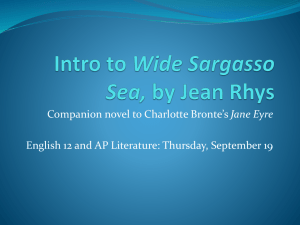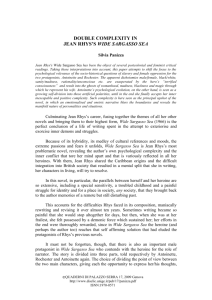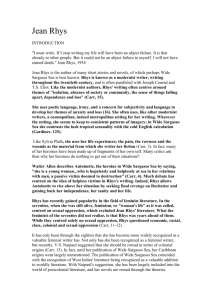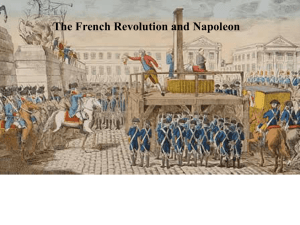Wide Sargasso Sea
advertisement
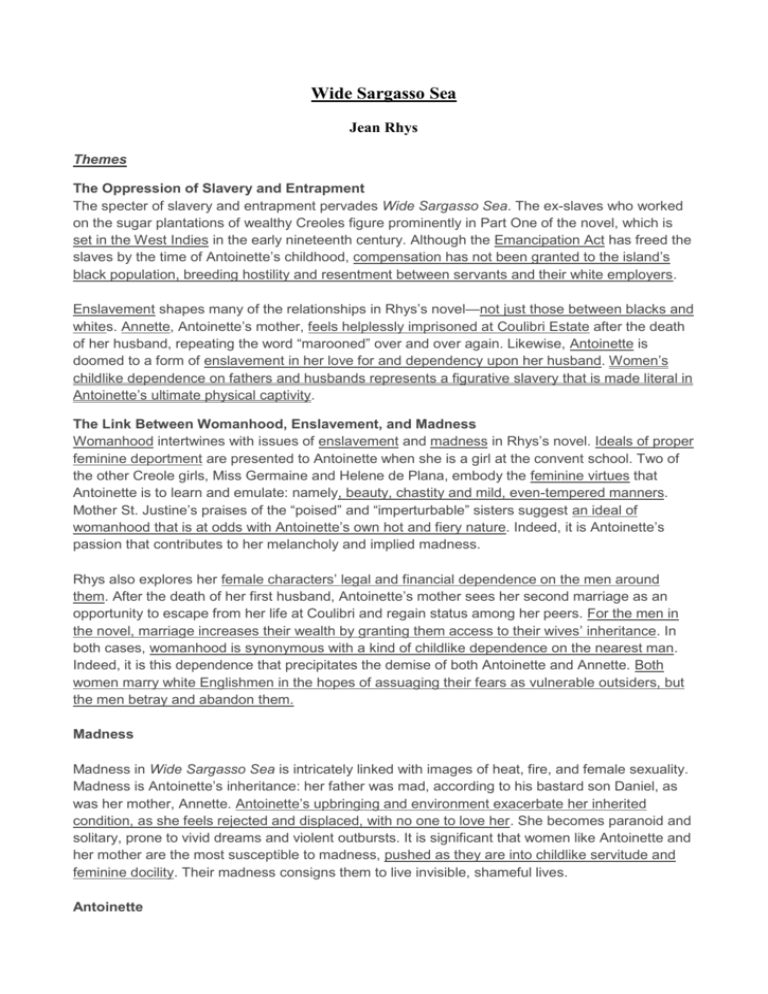
Wide Sargasso Sea Jean Rhys Themes The Oppression of Slavery and Entrapment The specter of slavery and entrapment pervades Wide Sargasso Sea. The ex-slaves who worked on the sugar plantations of wealthy Creoles figure prominently in Part One of the novel, which is set in the West Indies in the early nineteenth century. Although the Emancipation Act has freed the slaves by the time of Antoinette’s childhood, compensation has not been granted to the island’s black population, breeding hostility and resentment between servants and their white employers. Enslavement shapes many of the relationships in Rhys’s novel—not just those between blacks and whites. Annette, Antoinette’s mother, feels helplessly imprisoned at Coulibri Estate after the death of her husband, repeating the word “marooned” over and over again. Likewise, Antoinette is doomed to a form of enslavement in her love for and dependency upon her husband. Women’s childlike dependence on fathers and husbands represents a figurative slavery that is made literal in Antoinette’s ultimate physical captivity. The Link Between Womanhood, Enslavement, and Madness Womanhood intertwines with issues of enslavement and madness in Rhys’s novel. Ideals of proper feminine deportment are presented to Antoinette when she is a girl at the convent school. Two of the other Creole girls, Miss Germaine and Helene de Plana, embody the feminine virtues that Antoinette is to learn and emulate: namely, beauty, chastity and mild, even-tempered manners. Mother St. Justine’s praises of the “poised” and “imperturbable” sisters suggest an ideal of womanhood that is at odds with Antoinette’s own hot and fiery nature. Indeed, it is Antoinette’s passion that contributes to her melancholy and implied madness. Rhys also explores her female characters’ legal and financial dependence on the men around them. After the death of her first husband, Antoinette’s mother sees her second marriage as an opportunity to escape from her life at Coulibri and regain status among her peers. For the men in the novel, marriage increases their wealth by granting them access to their wives’ inheritance. In both cases, womanhood is synonymous with a kind of childlike dependence on the nearest man. Indeed, it is this dependence that precipitates the demise of both Antoinette and Annette. Both women marry white Englishmen in the hopes of assuaging their fears as vulnerable outsiders, but the men betray and abandon them. Madness Madness in Wide Sargasso Sea is intricately linked with images of heat, fire, and female sexuality. Madness is Antoinette’s inheritance: her father was mad, according to his bastard son Daniel, as was her mother, Annette. Antoinette’s upbringing and environment exacerbate her inherited condition, as she feels rejected and displaced, with no one to love her. She becomes paranoid and solitary, prone to vivid dreams and violent outbursts. It is significant that women like Antoinette and her mother are the most susceptible to madness, pushed as they are into childlike servitude and feminine docility. Their madness consigns them to live invisible, shameful lives. Antoinette The character of Antoinette derives from Charlotte Brontë's poignant and powerful depiction of a deranged Creole outcast in her gothic novel Jane Eyre. Rhys creates a prehistory for Bronte's character, tracing her development from a young solitary girl in Jamaica to a love-depraved lunatic in an English garret. By fleshing out Brontë's one-dimensional madwoman, Rhys enables us to sympathize with the mental and emotional decline of a human being. Antoinette is a far cry from the conventional female heroines of nineteenth- and even twentieth-century novels, who are often more rational and self-restrained (as is Jane Eyre herself). In Antoinette, by contrast, we see the potential dangers of a wild imagination and an acute sensitivity. Her restlessness and instability seem to stem, in some part, from her inability to belong to any particular community. As a white Creole, she straddles the European world of her ancestors and the Caribbean culture into which she is born. Left mainly to her own devices as a child, Antoinette turns inward, finding there a world that can be both peaceful and terrifying. In the first part of the novel we witness the development of a delicate child—one who finds refuge in the closed, isolated life of the convent. Her arranged marriage distresses her, and she tries to call it off, feeling instinctively that she will be hurt. Indeed, the marriage is a mismatch of culture and custom. She and her English husband, Mr. Rochester, fail to relate to one another; and her past deeds, specifically her childhood relationship with a half-caste brother, sullies her husband's view of her. An exile within her own family, a "white cockroach" to her disdainful servants, and an oddity in the eyes of her own husband, Antoinette cannot find a peaceful place for herself. Going far beyond the pitying stance taken by Bronte, Rhys humanizes "Bertha's" tragic condition, inviting the reader to explore Antoinette's terror and anguish. Mr. Rochester Mr. Rochester, Antoinette's young husband, narrates more than a third of the novel, telling, in his own words, the story of Antoinette's mental downfall. His arrival in Jamaica and his arranged marriage to Antoinette is prefigured in the first part of the novel by the appearance of Mr. Mason, another English aristocrat seeking his fortune through a Creole heiress (Antoinette’s mother). However, unlike Mason, Rochester remains nameless throughout the novel, referred to only as "that man" or "my husband." He is the nameless creator and, as a white man, his authority and privilege allow him to confer identity on others. For instance, he decides to rename his wife, calling her "Bertha" in an attempt to distance her from her lunatic mother, whose full name was Antoinette. Later, he takes away Antoinette's voice along with her name, refusing to listen to her side of the story. As he continues to fragment her identity, he creates the new name of "Marionetta," a cruel joke that reflects Antoinette's doll-like pliability. He ultimately refashions Antoinette into a raving madwoman and treats her as a ghost. Having totally rejected his Creole wife and her native customs, Rochester asserts his total English control over the Caribbean landscape and people. Rochester's narration in Part Two reveals that he and his estranged wife are actually more similar than dissimilar. Both characters are essentially orphans, abandoned by their family members to fend for themselves. As the youngest son, Rochester legally inherits nothing from his father, who already favors the older child. Antoinette, who was persistently neglected by her mother in favor of her brother, Pierre, receives an inheritance that is tainted, at best. She is left with the burdens of a divided cultural identity, the hatred of the blacks, the contempt of the whites, and the responsibility of a dilapidated estate. Both Rochester and Antoinette struggle for some sense of place and identity, and enter the arranged marriage with apprehension and anxiety
